Did you know that businesses using a CRM system experience a 29% increase in sales? In the fiercely competitive landscape of modern business, effective customer relationship management (CRM) is not just an option—it’s a necessity. As a seasoned CRM expert with years of experience optimizing customer relationship strategies for diverse businesses, I understand the pivotal role a robust CRM system plays in driving sales, enhancing customer satisfaction, and streamlining operations.
In this comprehensive guide, we’ll delve into the Best CRM for telemarketing, comparing top CRM solutions tailored specifically for telemarketing businesses. Selecting the right CRM can be the difference between hitting your sales targets and falling short. We’ll explore key features, pricing structures, and ideal use cases to help you make an informed decision that aligns with your business goals.
Choosing the right CRM is crucial for business success. It not only aids in customer retention but also ensures that your operations run smoothly and efficiently. A well-implemented CRM system can transform your telemarketing efforts, providing insights and tools that drive growth and improve customer interactions.
Throughout this article, you’ll find an in-depth analysis of the top CRM solutions available today, with a focus on their suitability for telemarketing businesses. We’ll cover everything from scalability and ease of use to customization options, ensuring you have all the information needed to select the best CRM for your telemarketing needs.
What to Look for in a CRM for Your Business
Scalability
One of the most critical factors to consider when selecting a CRM is scalability. Your business is likely to grow, and your CRM should be able to grow with you. A scalable CRM can handle increasing amounts of data and an expanding user base without compromising performance. This ensures that as your telemarketing team grows or your customer base expands, your CRM remains effective and efficient.
Scalability also means the CRM can adapt to your evolving business needs. Whether you’re expanding into new markets, launching new products, or diversifying your services, a scalable CRM provides the flexibility to adjust and scale your operations seamlessly. This adaptability is essential for maintaining a competitive edge and ensuring long-term success.
Ease of Use
A CRM system is only as good as its usability. An intuitive interface and straightforward onboarding process are essential, especially for small teams or those new to CRM systems. A user-friendly CRM reduces the learning curve, allowing your team to adopt the system quickly and start reaping the benefits without significant downtime.
Ease of use also encompasses the quality of customer support and training resources provided by the CRM vendor. Comprehensive tutorials, responsive support teams, and accessible documentation can significantly enhance the user experience, ensuring that your team can navigate the CRM efficiently and utilize its features to their full potential.
Customization
Every business has unique workflows and requirements, making customization a vital feature in a CRM system. The ability to tailor the CRM to your specific telemarketing processes ensures that the system aligns perfectly with your business operations. Customizable features may include personalized dashboards, configurable fields, and adaptable reporting tools.
Customization also extends to integrating the CRM with other tools and platforms you use. Whether it’s your email marketing software, customer support systems, or data analytics tools, a customizable CRM can seamlessly integrate, providing a unified platform that enhances productivity and data accuracy.
5 Best CRM Solutions for Telemarketing
Selecting the best CRM for telemarketing involves evaluating solutions that offer robust features tailored to the unique needs of telemarketing operations. Here are six top CRM solutions that stand out in the market:
1. HubSpot CRM
HubSpot is a popular, user-friendly CRM known for its integration of marketing, sales, and customer service tools. It’s an ideal solution for businesses of all sizes, with robust automation, reporting, and lead management features.
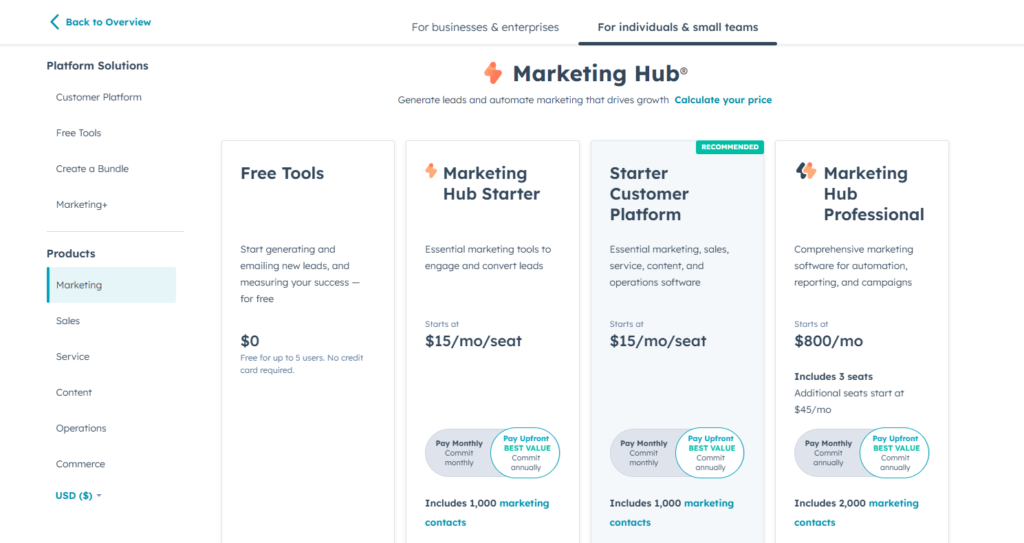
Key Features:
- Contact Management: Organizes customer data efficiently, allowing for quick access to contact information.
- Sales Pipeline: Visual representation of the sales funnel helps telemarketers track prospects through each stage.
- Email Tracking & Automation: Allows telemarketers to automate follow-ups and track customer email interactions.
- Live Chat & Chatbots: Engage website visitors in real-time, improving lead generation and customer support.
- Call Tracking: Logs and records calls, helping telemarketers improve customer interactions and monitor team performance.
Pricing:
- Free Plan: $0 for core features (contact management, limited reporting, deal tracking).
- Starter: $15/month (includes more advanced features like automation and email support).
- Professional: $800/month (custom reports, workflows, sales forecasting).
- Enterprise: $3,600/month (advanced customizations, deeper analytics).
Small to mid-sized telemarketing teams that need a scalable CRM with marketing integration and easy-to-use automation for lead generation and nurturing. Ideal for companies looking for a free plan with the option to upgrade as they grow.
2. Pipedrive CRM
Pipedrive is a sales-focused CRM designed to help sales and telemarketing teams streamline their workflow and prioritize leads. It emphasizes visual pipelines and ease of use, making it a top choice for teams looking to improve their sales processes.
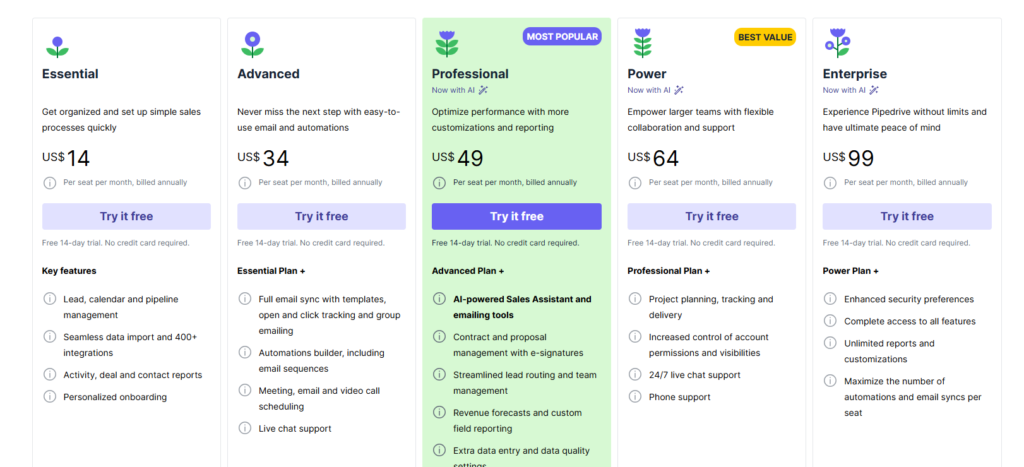
Key Features:
- Visual Sales Pipeline: Helps telemarketers visualize deals in progress and move them through the stages of the sales funnel more effectively.
- Call Tracking & Recording: Logs and records calls within the CRM, allowing telemarketers to track conversations and improve performance.
- Automation & Workflow Management: Automates repetitive tasks like sending follow-up emails, allowing telemarketers to focus on making calls.
- Lead & Deal Management: Organizes and tracks prospects, helping telemarketers stay on top of lead generation and conversions.
- Email Integration & Tracking: Syncs with email providers, allowing telemarketers to send, track, and manage emails directly from the CRM.
Pricing:
- Essential Plan: $14/month per user (basic sales pipeline and tracking features).
- Advanced Plan: $34/month per user (workflow automation, email syncing).
- Professional Plan: $49/month per user (call tracking, customizable reports).
- Power Plan: $64/month per user (enhanced collaboration, team management features).
- Enterprise Plan: $99/month per user (advanced security, personalized onboarding).
Small to mid-sized telemarketing teams looking for a visually driven CRM that focuses on sales pipeline management, call tracking, and automation. Ideal for telemarketing teams that need an intuitive system to manage large volumes of deals and calls.
3. Keap CRM
Keap (formerly Infusionsoft) is an all-in-one CRM designed for small businesses, offering robust automation tools, sales pipelines, and email marketing. It’s built to streamline customer relationship management, helping businesses grow by automating repetitive tasks and improving lead management.
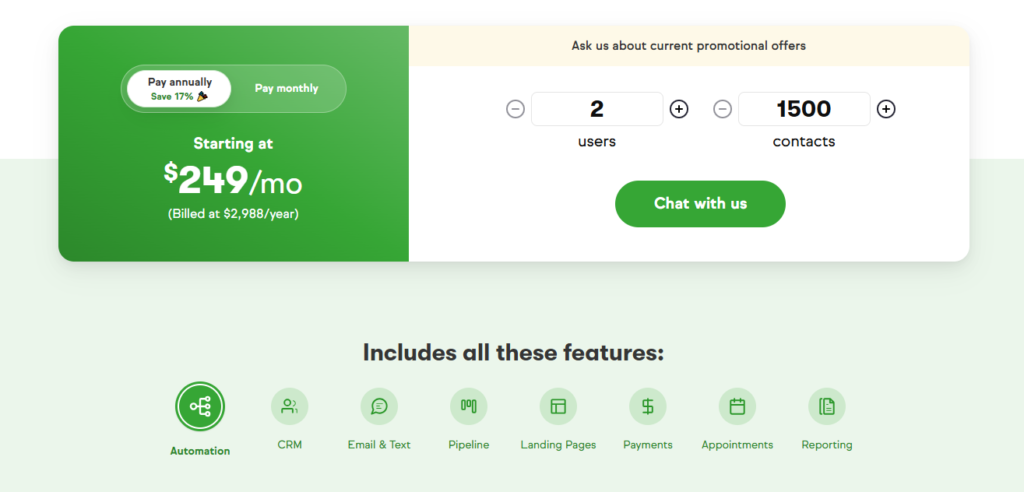
Key Features:
- Automation & Workflow Builder: Automates follow-ups, appointment setting, and other tasks, allowing telemarketers to focus on calls and lead nurturing.
- Lead Capture & Management: Efficiently tracks and organizes leads, ensuring telemarketers can prioritize high-value prospects.
- Call Management: Logs calls and integrates with phone systems, helping telemarketers track and follow up on interactions.
- Email & SMS Marketing Integration: Allows telemarketers to automate email and SMS campaigns to engage prospects more effectively.
- Sales Pipeline Management: Helps visualize and track sales opportunities, ensuring telemarketers stay on top of potential leads.
Pricing:
- $249/month for 1,500 contacts and 2 users (additional costs for more users or contacts).
Small telemarketing teams or solo entrepreneurs who need advanced automation, follow-up, and lead management features. Ideal for teams that prioritize automation for tasks like email marketing and scheduling, allowing them to focus on generating and closing leads.
4. Zoho CRM
Zoho CRM is a popular cloud-based customer relationship management software that helps businesses manage customer relationships and sales. It offers an array of tools to streamline communication, automate processes, and improve lead management, making it a solid choice for telemarketing.
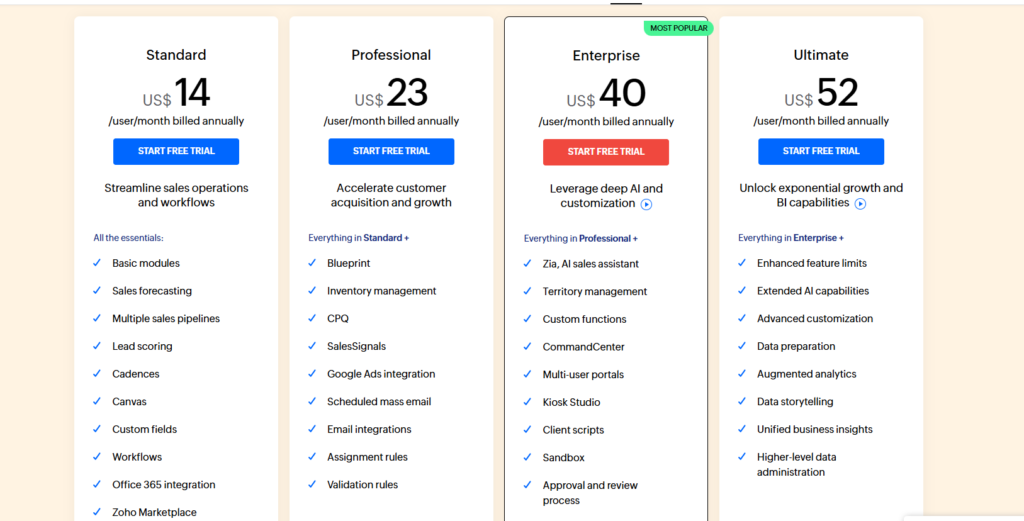
Key Features:
- Lead Management: Automatically capture leads from web forms, emails, and calls, making it easy to follow up on prospects.
- Telephony Integration: Built-in phone bridge that supports integration with various telephony providers, allowing you to make calls directly from the CRM.
- Automation: Workflow automation for lead nurturing, follow-ups, and reminders, saving time for telemarketers.
- Analytics: Detailed reports and analytics to track the success of telemarketing campaigns and agent performance.
- Omnichannel: Manage communication through email, phone, social media, and live chat from one platform, ensuring every customer touchpoint is covered.
Zoho CRM is ideal for small to mid-sized telemarketing teams that need efficient lead management, automation, and integration with telephony systems. It’s a great option for businesses looking for an affordable, scalable solution with robust customization options.
5. Salesforce CRM
Salesforce CRM is a highly customizable, cloud-based customer relationship management platform known for its advanced features and scalability. It caters to businesses of all sizes, offering solutions for sales, marketing, customer service, and more, making it a go-to tool for telemarketing professionals.
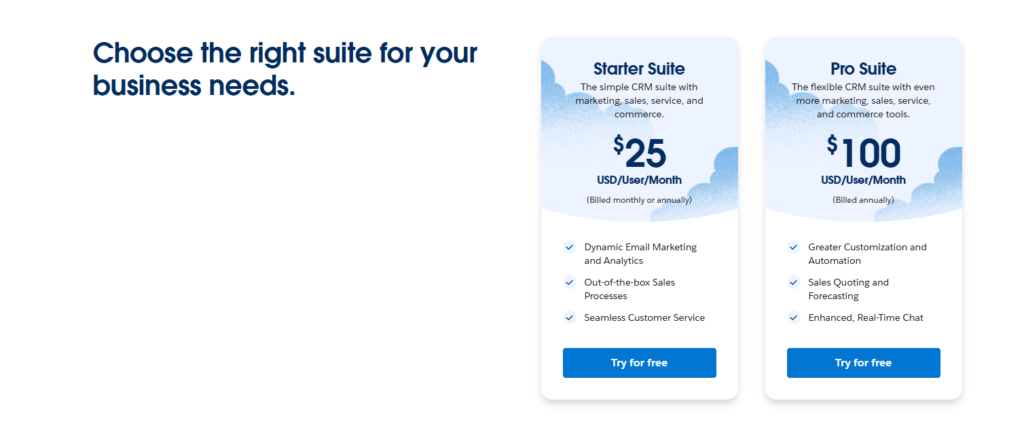
Key Features:
- Lead and Opportunity Management: Organize and prioritize leads for efficient follow-ups, allowing telemarketers to focus on high-converting prospects.
- Telephony Integration: Easily integrates with various telephony systems, enabling call tracking, recording, and analytics directly in the CRM.
- AI-Powered Einstein Analytics: Provides predictive insights into lead behavior and sales outcomes, helping telemarketers optimize their pitch and approach.
- Workflow Automation: Automate repetitive tasks such as call scheduling, follow-ups, and lead nurturing, improving overall efficiency.
- Comprehensive Reporting: Advanced reporting and dashboards provide real-time insights into telemarketing campaign performance and individual agent productivity.
Salesforce CRM is best for large telemarketing teams or enterprises that need extensive customization, advanced analytics, and powerful automation features. It’s ideal for businesses that want to scale and refine their telemarketing efforts with data-driven insights.
Which CRM is Best for Your Telemarketing Business?
After evaluating the top CRM solutions tailored for telemarketing, Salesforce Sales Cloud emerges as the best CRM for telemarketing businesses that require a comprehensive, scalable solution with advanced features and robust integrations. Its extensive feature set, coupled with its ability to grow with your business, makes it a standout choice for telemarketers aiming for long-term success and efficiency.
However, if you’re a small to medium-sized telemarketing team seeking a more affordable and user-friendly option, Zoho CRM offers excellent flexibility and a wide range of features that can be tailored to your specific needs. For those looking for a free solution with essential CRM functionalities, HubSpot CRM is an ideal choice.
Use Case Recommendations
Different telemarketing businesses have varying needs based on their size, industry, and specific requirements. Here are some CRM recommendations based on different use cases:
- Small Telemarketing Teams: HubSpot CRM or Zoho CRM are excellent choices, offering affordability and ease of use.
- Medium to Large Telemarketing Enterprises: Salesforce Sales Cloud provides the scalability and advanced features needed to manage larger teams and more complex operations.
- Budget-Conscious Businesses: Pipedrive and Freshsales offer robust features at competitive prices, making them suitable for businesses looking to maximize value without breaking the bank.
- Businesses Seeking Integrated Project Management: Bitrix24 combines CRM functionalities with project management tools, ideal for telemarketers who require a unified platform for both sales and project management.
Next Steps
Choosing the right CRM is a critical step towards enhancing your telemarketing efforts and achieving your sales goals. Here’s how you can take action today:
- Assess Your Needs: Determine the specific features and functionalities that your telemarketing team requires.
- Explore CRM Options: Visit the websites of the recommended CRMs to learn more about their offerings and how they align with your business needs.
- Start a Free Trial: Most CRM providers offer free trials. Take advantage of these to test the CRM’s features and usability firsthand.
- Schedule a Demo: Contact CRM vendors to schedule personalized demos, allowing you to see the CRM in action and ask any questions you may have.
- Compare and Decide: Evaluate the pros and cons of each CRM based on your trials and demos to make an informed decision.
By following these steps, you’ll be well on your way to selecting the best CRM for your telemarketing business, setting the stage for increased sales, improved customer relationships, and streamlined operations.
How to Choose a CRM: A Beginner’s Buying Guide for Telemarketing Businesses
Selecting the right CRM can seem daunting, especially if you’re new to customer relationship management systems. This step-by-step guide will help you navigate the process and choose a CRM that best fits your telemarketing business.
Step 1: Identify Your Business Needs
Begin by outlining your specific telemarketing needs. Consider factors such as:
- Lead Management: How do you capture, track, and nurture leads?
- Sales Pipeline: What stages does a lead go through before becoming a customer?
- Communication Tools: Do you need integrated phone systems or email tracking?
- Reporting and Analytics: What kind of data insights are essential for your team?
- Integration Requirements: What other tools or platforms does your CRM need to integrate with?
Step 2: Evaluate CRM Features
Based on your business needs, create a list of must-have features. Common CRM features for telemarketing include:
- Contact Management: Centralized database for all customer information.
- Automated Workflows: Streamline repetitive tasks to save time.
- Lead Scoring: Prioritize leads based on their likelihood to convert.
- Email and Call Integration: Track all customer interactions in one place.
- Customizable Dashboards: Visualize key metrics and performance indicators.
Step 3: Consider Your Budget
CRMs come in various pricing tiers, from free versions to premium plans. Determine how much your business is willing to spend on a CRM and consider the value each option provides. Remember to account for additional costs such as implementation, training, and ongoing support.
Step 4: Assess Scalability
Choose a CRM that can grow with your business. Ensure that the CRM can handle an increasing number of users, contacts, and data without sacrificing performance. Scalability is crucial for accommodating future growth and expanding your telemarketing operations.
Step 5: Test the User Experience
A CRM should be intuitive and easy to use. Take advantage of free trials and demos to assess the user experience. Ensure that your team finds the interface accessible and that the onboarding process is straightforward. A user-friendly CRM will enhance adoption rates and overall efficiency.
Step 6: Review Customer Support
Reliable customer support is essential, especially during the initial setup and onboarding phases. Evaluate the CRM vendor’s support options, such as live chat, email support, phone assistance, and comprehensive knowledge bases. Prompt and effective support can significantly impact your CRM implementation success.
Step 7: Check Integration Capabilities
Your CRM should seamlessly integrate with other tools and platforms your business uses, such as email marketing software, customer support systems, and data analytics tools. Effective integrations enhance data accuracy, streamline workflows, and improve overall operational efficiency.
Step 8: Read Reviews and Seek Recommendations
Research reviews and testimonials from other telemarketing businesses to gain insights into the CRM’s performance and reliability. Seek recommendations from industry peers or consult with CRM experts to ensure you’re making a well-informed decision.
By following this step-by-step guide, you can confidently choose a CRM that aligns with your telemarketing business needs, budget, and growth plans, setting the foundation for enhanced sales performance and customer satisfaction.
Conclusion
Recap
Selecting the Best CRM for telemarketing is a critical decision that can significantly impact your business’s sales performance and customer relationships. We explored six top CRM solutions—Salesforce Sales Cloud, HubSpot CRM, Zoho CRM, Freshsales by Freshworks, Pipedrive, and Bitrix24—each offering unique features tailored to telemarketing needs. Key considerations include scalability, ease of use, customization, pricing, and integration capabilities.
Final Thoughts
When choosing a CRM, it’s essential to consider not just your current needs but also your long-term business goals. A scalable CRM that can adapt to your growing telemarketing operations will provide sustained value and support your business’s evolution. Additionally, prioritizing a user-friendly interface and robust customer support ensures a smooth implementation and high adoption rates among your team.
Remember, the right CRM is more than just a tool—it’s a strategic asset that can drive sales growth, enhance customer satisfaction, and streamline your operations. Take the time to assess your needs, explore your options, and choose a CRM that aligns with your business objectives.
Call to Act telemarketing strategy with the best CRM solution? Explore Salesforce Sales Cloud, HubSpot CRM, Zoho CRM, Freshsales by Freshworks, Pipedrive, and Bitrix24 today. Start your free trial or schedule a demo to discover how these CRMs can transform your telemarketing efforts and drive your business towards greater success.
FAQs
Do I really need a CRM?
Absolutely. A CRM system centralizes customer information, streamlines sales processes, enhances customer interactions, and provides valuable insights through analytics. For telemarketing businesses, a CRM is essential for managing leads, tracking interactions, and optimizing sales strategies, ultimately driving sales growth and improving customer satisfaction.
How secure is my data in a CRM?
Reputable CRM providers prioritize data security, implementing measures such as encryption, regular security audits, and compliance with data protection regulations (e.g., GDPR). It’s crucial to choose a CRM that offers robust security features to protect your sensitive customer data and ensure compliance with industry standards.
Can a CRM integrate with my existing tools?
Yes, most modern CRMs offer extensive integration capabilities with various tools and platforms, including email marketing software, customer support systems, data analytics tools, and more. Seamless integration ensures that your CRM works harmoniously with your existing tools, enhancing data accuracy and streamlining workflows.
What is the cost of implementing a CRM system?
The cost of implementing a CRM system varies based on factors such as the number of users, selected features, and the CRM provider. CRMs typically offer tiered pricing plans to accommodate different budgets and business sizes. It’s important to assess your budget and choose a CRM that offers the best value for your investment, considering both upfront costs and ongoing expenses.
How long does it take to set up a CRM?
The setup time for a CRM depends on the complexity of your business needs and the CRM’s features. Basic CRMs with straightforward functionalities can be set up within a few hours to days. More comprehensive systems may require weeks for full implementation, including data migration, customization, and training. Effective planning and utilizing vendor support can streamline the setup process.
Can a CRM help improve customer retention?
Yes, a CRM enhances customer retention by providing a centralized platform for managing customer interactions, tracking preferences, and addressing issues promptly. By leveraging CRM insights, businesses can personalize their communication, anticipate customer needs, and deliver exceptional service, thereby fostering long-term relationships and increasing customer loyalty.
Is training required to use a CRM effectively?
While many CRMs are designed to be user-friendly, training is beneficial to ensure your team fully understands and utilizes the system’s features. Proper training can enhance user adoption, improve efficiency, and maximize the CRM’s potential to support your telemarketing efforts. Most CRM providers offer training resources, tutorials, and customer support to facilitate effective usage.
What CRM features are most important for telemarketing?
Key CRM features for telemarketing include lead management, sales pipeline tracking, email and call integration, automated workflows, and robust reporting and analytics. These features enable telemarketers to efficiently manage leads, track interactions, automate repetitive tasks, and gain insights into sales performance, ultimately driving higher sales and improved customer relationships.
Can a CRM system help with compliance and data protection?
Yes, many CRM systems offer features and tools to help businesses comply with data protection regulations, such as GDPR. These may include data encryption, access controls, audit logs, and tools for managing customer consent. Choosing a CRM that prioritizes compliance ensures that your business adheres to legal requirements and protects customer data effectively.
What is the best CRM for small telemarketing teams?
For small telemarketing teams, HubSpot CRM and Zoho CRM are excellent choices. HubSpot offers a user-friendly interface and a robust free tier, while Zoho provides flexibility and a wide range of features at an affordable price. Both CRMs are scalable, allowing your small team to grow without outgrowing the system.
By addressing these frequently asked questions, I hope to provide clarity and assist you in making an informed decision about the best CRM for your telemarketing business. Remember, the right CRM can be a game-changer, driving sales growth, enhancing customer satisfaction, and streamlining your operations.
I’m Rejaul Karim, an SEO and CRM expert with a passion for helping small businesses grow online. I specialize in boosting search engine rankings and streamlining customer relationship management to make your business run smoothly. Whether it's improving your online visibility or finding better ways to connect with your clients, I'm here to provide simple, effective solutions tailored to your needs. Let's take your business to the next level!


